Onima VT participated in the Regional Dialogue on Agroecology held on May 12 and she reflects on it here.
CONTEXT
Both global agriculture and the food system are in crisis. They are responsible for one-third of global Green House Gas emissions, alarming biodiversity loss, environmental pollution, degradation of land and water resources, and increasing social inequities, while still not providing food security and adequate nutrition for all. As stated in many recent major reports from the Intergovernmental Panel on Climate Change (IPCC 2022), High Level Panel of Experts on Food Security and Nutrition (HLPE 2019), International Panel of Experts on Sustainable Food Systems (IPES-Food 2016) and others, there is need for a profound transformation of agricultural and food systems so as to ensure food and nutritional security, social and economic equity, as well as sustain the ecosystem on which all these elements depend. Agroecology has been proposed as a promising approach to achieving greater sustainability in the 21st century by incorporating technological and institutional innovations, adaptive management, along with social learning.
|
Box 1: What is Agroecology? Source: FAO Agroecology Knowledge Hub |
ABOUT THE REGIONAL DIALOGUE
The Regional Dialogue on Agroecology held on May 12 was co-organized by Global Alliance for the Future of Food (GAFF), Asia Farmers Association (AFA), and Andhra Pradesh Community-managed Natural Farming (APCNF) with technical assistance from the Food and Agriculture Organization (FAO). This event was a follow up to the GAFF, 2021 publication entitled The Politics of Knowledge: Understanding the Evidence for Agroecology, Regenerative Approaches and Indigenous Food Systems with an associated interactive website.
The event was one among the six regional dialogues that aimed to situate the key messages from the compendium into the processes and priorities of regional and national organizations. The overall objective was to increase understanding, interest and support for agroecology from policymakers and funders. It was a ‘by invitation only’ dialogue with approximately 80 policymakers, donors, researchers, and representatives from civil society and farmer organizations across Asia. The highlights of the event are shared here for your perusal and for posterity.
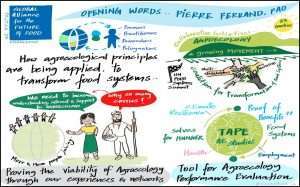 ©Srinivas Mangipudi
©Srinivas Mangipudi
In the opening presentation, Pierre Ferrand, Agriculture Officer (AE), FAO Regional Office for the Asia and the Pacific, Thailand, shared his thoughts on why agroecology is gaining more and more attention and why this momentum cannot be held back. He emphasized that even though FAO and United Nations Food Systems Summit (UNFSS) have highlighted the importance of agroecology for sustainable food systems, there still may be many critical stakeholders including donors, scientists and policymakers who choose to distance themselves from agroecology voicing skepticism about its viability, profitability and scalability. During his presentation, he gave an overview of the event and stated that the overall objective of this dialogue is to increase understanding, interest and support for agroecology from all stakeholders, including policymakers.
SCALING UP AGROECOLOGY: UP, DEEP AND CUT
In this session, the first speaker was Vijay Kumar Thallam representing Andhra Pradesh Community-managed Natural Farming (APCNF). His presentation glanced into how APCNF’s then Zero Budget Natural Farming (ZBNF) – a set of farming methods and a grassroots peasant movement in India born in Karnataka became the world’s largest agroecology program in terms of the number of farmers enrolled. He stated that the real success lies in its innovative scaling-out strategy of farmer-to-farmer extension systems. This involved identifying ‘Champion Farmers’ who act as trainers, and Women’s Self-help Groups that play a critical role in collective action, knowledge dissemination, supporting each other during the transition, financing members to purchase the inputs required for natural farming, monitoring, and managing the program. APCNF’s scaling strategy takes a ‘whole village’ approach, with the objective of converting all village farmers to natural farming practitioners. He underscored the support of the state Agriculture Department in the transition process as a very important factor in the success of the program. He concluded that not only can yields on farms implementing agroecological practices be comparable or superior, but that because these farms are more diversified, they are providing better food and nutrition security through more diverse diets.
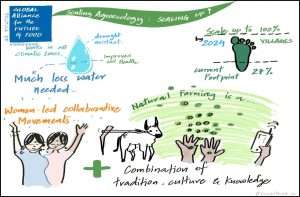 ©Srinivas Mangipudi
©Srinivas Mangipudi
The second speaker was Ashlesha Khadse from Thousand Currents, India. She talked of how the compendium deals with transformative agroecology (AE). She said AE is transformative because it centres on this very question of rights and justice. It talks about farmers’ access to resources, credit, and entitlements and thus food sovereignty. She quoted, “Agroecology is about interculturality. It’s about dialogue between the different forms of knowledge. It’s about dialogue between modern science and also indigenous knowledge and farmers’ knowledge. It requires different ideas, not just one science or one world view, but it requires many.”
CO-CREATION OF KNOWLEDGE THROUGH AGROECOLOGY
Esther Penunia, Asian Farmers Association for Sustainable Rural Development (AFA), Philippines, made a short presentation on AFA, a regional farmers’ organization. In her presentation, she shared details of five national peer-to-peer approach cases that are trying to promote agroecology. These include:
- Integrated, diversified organic farming, Philippines;
- Master trainer approach of Self-Employed Women’s Association (SEWA), India;
- System of Rice Intensification (SRI) with Farmer and Nature Net (FNN), Cambodia;
- Participatory action research, Lao Farmer Network (LFN), Laos; and
- Participatory plant breeding, Aliansi Petani Indonesia (API), Indonesia.
She also spoke about AFA’s knowledge fairs and study visits; collective action on forgotten food in collaboration with Asia-Pacific Association of Agricultural Research Institution (APAARI), International Crops Research Institute for the Semi-Arid Tropics (ICRISAT), Biodiversity International and Global Forum on Agricultural Research (GFAR); and Citizen science for agroecology, a project called One Million Voices Initiative as part of the Transformative Partnership Platform on Agroecology (TPP-AE).
She concluded with: “Family farmers are not just food producers but are knowledge producers and solution providers. Peer-to-peer, in situ, are effective approaches so we have to invest in the transformation to agroecology through peer-to-peer approaches.”
 ©Srinivas Mangipudi
©Srinivas Mangipudi
Maria Corazon Tan, University of the Philippines, shared her experience with MASIPAG, a farmer-led network of people’s organizations, NGOs and scientists working towards the sustainable use and management of biodiversity through farmers’ control of genetic and biological resources, agricultural production and associated knowledge. MASIPAG supports farmers to do their own research for developing appropriate and locally adaptable farming technologies through the FDAT (Farmer-developed and Adapted Technologies) program. It has developed its farmer’s participatory guarantee system named PGS Pilipinas for certification and marketing of agricultural produce. She concluded with the MASIPAG statement for Earth Day, April 2020, “Agroecology goes hand-in-hand with the people’s call for food sovereignty; it gives priority to local economies to be able to respond to local needs and it puts farmers first in the agenda. Agroecology places farmers and the peoples’ right to food at the center of policies and the people as active participants in the attainment of their right to food.”
After this session, the participants were asked to join any one of the breakout groups viz., Pesticide reduction and Agroecological Approaches handled by Sarojini Rengam, PAN-Asia Pacific, Malaysia, or Connecting Producers and Consumers through Agroecological Markets led by Marut Jatiket, The Field Alliance, Thailand, as per their interest and expertise. I chose to join the latter as both were held simultaneously.
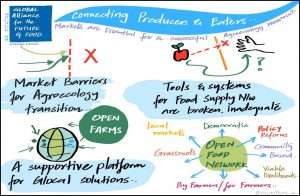 ©Srinivas Mangipudi
©Srinivas Mangipudi
CONNECTING PRODUCERS AND CONSUMERS THROUGH AGROECOLOGICAL MARKETS
Dr Shi Yan, URGENCI, China, shared her inspiration behind opening Shared Harvest – one of the first farms in China to follow the community-supported agriculture (CSA) model – where consumers can buy organic, pesticide-free meat and vegetables directly from producers. The growers and producers provide mutual support and share the risks of food production, members pay a fee and then receive a share of the harvest. It targets three core goals: strengthening the relationship between citizens and farmers, protecting the income of farmers in ecological agriculture, and improving the status of food security.
The second speaker was Tammi Jonas, Alliance for Food Sovereignty, Australia. She opened her presentation by blaming AE transition barriers using IPES-food (2016) findings-8 key lock-ins weakening alternative pathways to success as reference. Later in her presentation, she talked about Open Food Network (OFN), a democratic platform that has been working on the challenges of connecting smallholders to agroecological markets for more than a decade. This open-source platform enables new, ethical supply chains. Food producers can sell online, wholesalers can manage buying groups and supply produce through networks of food hubs and shops. Communities can bring together producers to create a virtual farmers’ market, building a resilient local food economy. While concluding, she quoted the OFN ambassador’s message – “Open Food Network is an essential tool. It helps connect these eaters directly with local producers, enabling them to support the emergence of local agrifood systems.” (Olivier De Schutter)
Lastly, a response session was conducted with key speakers representing multilateral donor organizations: Rikke Olivera, International Fund for Agricultural Development (IFAD); Social movement/farmer organization: Marlene Ramirez, Asia DHRRA and Foundation; Gayatri Lobo, A.T.E. Chandra Foundation (ATECF); that was moderated by Faris Ahmed, a consultant with GAFF. The question raised by the moderator to the speakers was: “What resonates with you as funders and donors in terms of priorities, collaborative relationships, and funding modalities? How can you, as donors, funders and policymakers, support agroecological transitions and move to transition formative approaches? How can you support the demonstration of co-benefits and work to convince policymakers?”
Rikke Olivera spoke about IFAD’s initiatives for the scaling-up of agroecology. IFAD looked into all four levels of thinking to design projects: farm level, landscape network, market, and policies. She said key changes that contribute to AE transition and food security include:
- implementing true cost accounting;
- putting greater emphasis on the socio-economic benefits of farmers; and
- creating and documenting evidence in support of agroecology.
Marlene Ramirez summarized important calls from the speakers into five main points. Those were:
- building strong farmers’ organizations;
- engaging academic research centres and former scientists to bring change in knowledge and innovations at the field level;
- greater investment in gender mainstreaming and women empowerment;
- investing for and by young farmers; and
- lastly pursuing territorial agriculture to give more attention to bottom-up and local people-oriented development.
Gayatri Lobo expressed her view by stating, “Donors typically look at scaling in a very linear fashion, and that’s perhaps the safest way to fund. Donors need to fund experiments and research and be okay if it doesn’t always produce the results that are expected. The need of the hour is to think like venture capitalists. Some investments will fail, some investments will have huge successes, and then this whole range in between that spectrum.” She said donor organizations should have the ability to pick evidence across geographies and to use that to influence policymakers. She concluded by saying, “Civil society organizations (CSOs) and donors need to work together, not just in a traditional sense, but in a systematic and strategic manner, where policies can change, our farmers can thrive, and the planet and its inhabitants can get healthier.”
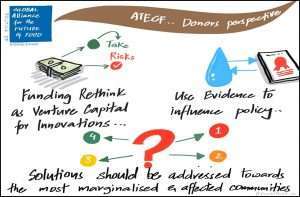 ©Srinivas Mangipudi
©Srinivas Mangipudi
The event concluded with closing remarks by Dr Dao The Anh, Vietnam Academy of Agricultural Sciences (VAAS), Vietnam. He spoke of the status of agroecology in Vietnam. He said as part of the government promoting AE transition in Vietnam, an action plan for a sustainable food system for 2030-31 has been developed. It addresses five objectives: first, ensure access to safe and traditional food for all people; second, shift to a sustainable consumption pattern so as to reduce food loss and food wastage; third, boost nature-positive and agroecological production; fourth, enhance competitive agrifood valuation which includes the value channel; and fifth, build resilience to shock and stress. In his wrap-up comments, he said, this dialogue on agroecology provided an opportunity to learn about agroecology practices and policy across the continent and across donors. With the active contribution of different actors participating in this dialogue, the agroecology movement will have a better future in Asia. At the end of the event, sketches of different sessions of the dialogue made by Srinivas Mangipudi, India, were shared on the screen.
MY LEARNINGS
The Regional Dialogue on Agroecology focussed on clear opportunities to learn about the agroecological practices and policies across Asia. This 120-minute dialogue has tried to showcase how agroecological principles are being applied by farmers, practitioners, researchers and policymakers to transform food systems. As a participant, it helped me to explore case studies on scaling out, co-creation of knowledge, reduction of pesticides through agroecological alternatives, and connecting consumers to food producers. It provided information that there are businesses, mostly those smaller in scale that operate on the local and regional level, that are resisting the pressure of a profit-based economy by including social and environmental dimensions to their goals and values.
The speakers emphasized the key role of EAS providers in the AE transition. EAS providers need to adopt a territorial approach, provide wide ranging advice on agroecological practices, bridge modern science and practice through traditional and local knowledge and promote horizontal exchanges that empower producers to co-create knowledge and identify locally derived and appropriate solutions. This leads to integrative farmer-led and community-led extension support programs. Diversified farming systems will contribute to the achievement of food sovereignty, social and economic equity, and environmental sustainability.
 Onima VT has a Doctorate in Agricultural Extension; she is currently working as an independent consultant based in the USA, and has worked previously as a Research Officer with CRISP from 2017 to 2020. She can be reached at onimavt@gmail.com
Onima VT has a Doctorate in Agricultural Extension; she is currently working as an independent consultant based in the USA, and has worked previously as a Research Officer with CRISP from 2017 to 2020. She can be reached at onimavt@gmail.com

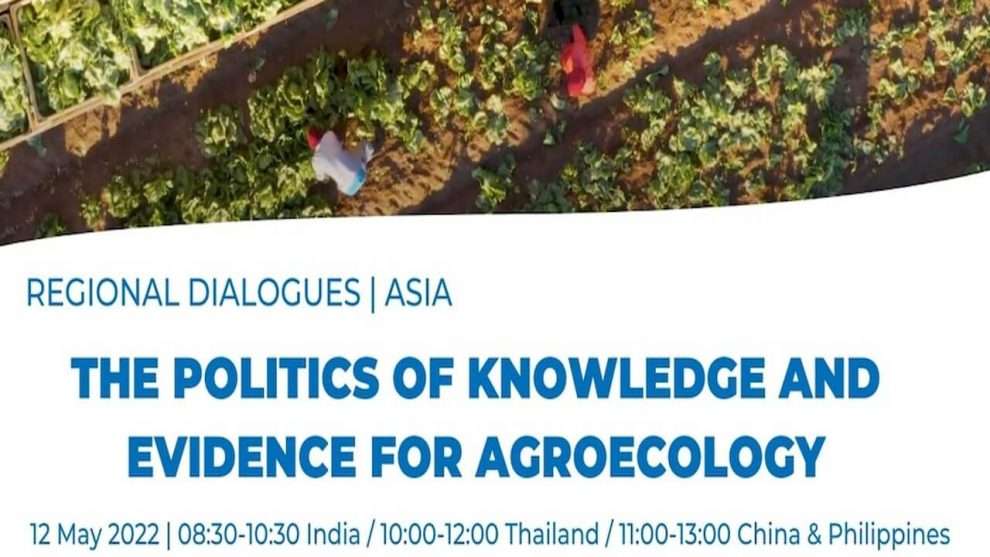

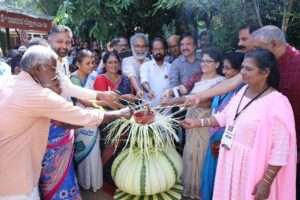

Add Comment